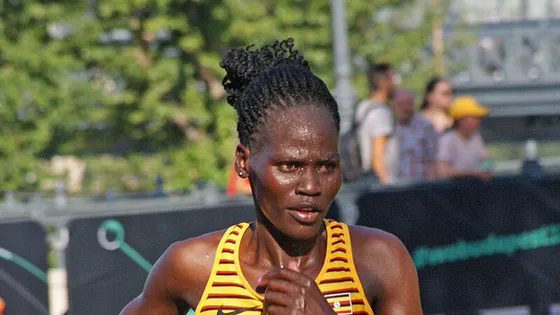Rebecca Cheptegei, a celebrated Ugandan athlete who competed in the 10,000m at the Paris Olympics, is currently fighting for her life after a horrific attack allegedly carried out by her boyfriend. The incident, which occurred just yesterday in Kitale, Trans Nzoia County, has left the sports world in shock and mourning.
Cheptegei was reportedly doused with petrol and set on fire, sustaining burns that cover 75 percent of her body. She was initially rushed to Kitale Level Four Hospital before being transferred to Moi Teaching and Referral Hospital in Eldoret, where she is receiving intensive care. The severity of her injuries and the brutal nature of the assault have sparked widespread outrage and renewed calls for stronger measures to protect athletes from gender-based violence (GBV).
This tragic incident is the latest in a disturbing trend of GBV against athletes in Kenya and beyond, highlighting the vulnerability of even the most successful and high-profile individuals. The attack on Cheptegei evokes painful memories of previous cases where athletes have suffered violence, often at the hands of those closest to them.

One of the most high-profile cases of GBV in Kenya is that of Agnes Tirop, a world-renowned long-distance runner and Olympian. In October 2021, Tirop’s life was tragically cut short when she was found dead in her home with stab wounds. The 25-year-old, who had represented Kenya at the Tokyo Olympics just months earlier, was allegedly murdered by her husband. Her death sent shockwaves through the sports community and brought the issue of GBV against athletes to the forefront of national and international discussions.
Another troubling case is that of Ruth Chepngetich, a prominent Kenyan marathoner who has also experienced domestic violence. Chepngetich, who won the 2019 World Athletics Championships marathon in Doha, has spoken openly about the physical and emotional abuse she endured from her partner. Her story is a stark reminder of the challenges female athletes face, both in their professional careers and in their personal lives, where they often encounter control, intimidation, and violence.
In 2018, Jane Wanjiru Gakunyi, a former 800m runner from Kenya, was another victim of gender-based violence. Gakunyi, who had retired from athletics, was brutally assaulted by her husband, leaving her with severe injuries that required extensive medical treatment. Her case further highlighted the pervasive issue of GBV against women in Kenya, regardless of their social or professional status.
These incidents are part of a broader pattern of violence that affects not just athletes but women across Kenya. However, the visibility and prominence of athletes mean that their experiences often resonate more widely, drawing attention to the persistent issue of GBV in the country. The rise in these cases has prompted calls from various quarters, including government officials, human rights organizations, and fellow athletes, for more comprehensive efforts to combat GBV.
ALSO READ
- Olympian Rebecca Cheptegei Battles for Survival After Shocking Assault
- Farewell to a Football Legend: Luis Suarez’s Heartfelt Goodbye to International Glory
- You Won’t Believe What Kylian Mbappé’s Father Did Behind the Scenes
Efforts to address this issue have included campaigns aimed at raising awareness of GBV, providing support to victims, and implementing stricter laws to punish perpetrators. Sports organizations and federations in Kenya have also been urged to take a more active role in protecting their athletes, including offering counseling services, legal support, and creating safe spaces where athletes can report abuse without fear of retribution.
Moreover, the sports community has begun to rally around victims of GBV, offering support and solidarity. The deaths and assaults on athletes like Tirop, Chepngetich, Gakunyi, and now Cheptegei have led to increased advocacy for gender equality and the protection of women in sports. This movement is gaining momentum, with more athletes, both male and female, speaking out against GBV and calling for systemic change.
While the rise in GBV cases against athletes in Kenya is alarming, it has also led to a greater awareness of the issue and a growing determination to confront it. The stories of athletes like Rebecca Cheptegei, Agnes Tirop, Ruth Chepngetich, and Jane Wanjiru Gakunyi serve as both a warning and a call to action. They remind us that even the strongest and most successful individuals are not immune to the threat of violence and that it is imperative for society to stand together in the fight against GBV.



